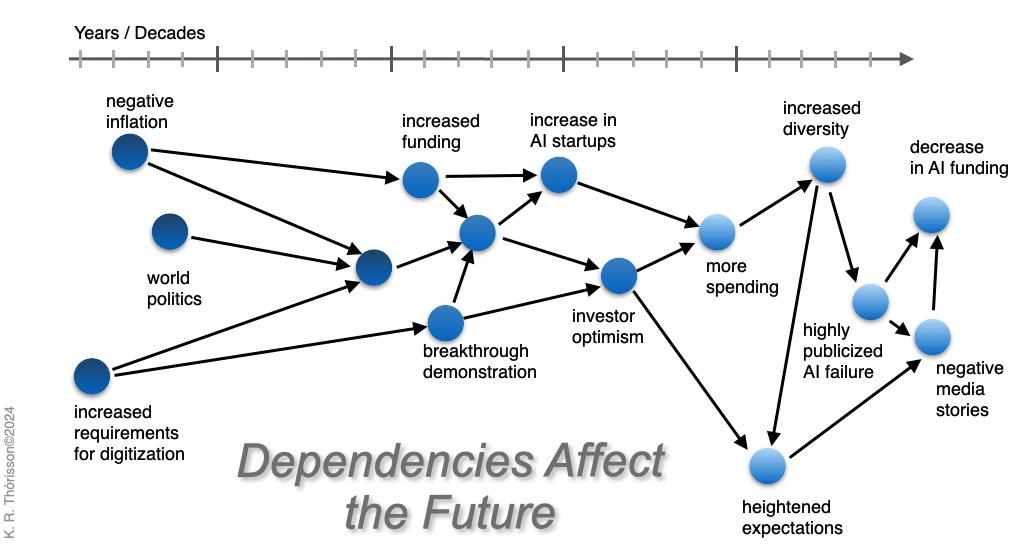public:t-709-aies-2024:aies-2024:futurology
Table of Contents
DCS-T-709-AIES-2024 Main
Link to Lecture Notes
FUTURES STUDIES
Knowing the future
Futurology
| What it is | Futurology is what we call “studying the future”. Systematic prediction of what may happen in the future, and when. |
| Why it matters | Allows preparation for what may come. |
| How it Works | A bit like quantum physics: You can either say what will happen, or when something might happen, but not both at the same time. |
| The Next 20 Years | To understand how AI may impact ethical concerns, and what the ethics of AI will become, we must look to the future. That, however, calls for a crystal ball. |
| Further Readings | Futures Studies on Wikipedia |
Crystal Ball
| Our Crystal Ball | is composed of parts that allow studying certain key factors in isolation. | |
| We can arm ourselves with: | ||
| 1. | Remaining open questions in AI. | |
| 2. | Understanding the drivers of “progress”. | |
| 3. | Identifying and mapping out key causal factors of change. | |
| And | use them to dissect, study, and analyze their nature, behavior, and interaction. | |
Three Claims About the Future
| #1: | Rate of progress in automation through AI depends on rate of progress of basic research in AI | |
| #2: | Rate of progress in AI basic research depends on when these four mental processes will be automated: | |
| a. | General autonomous learning | |
| b. | Empirical reasoning over autonomously learned knowledge | |
| c. | Creative autonomous goal generation and management | |
| d. | All three unified in a single system | |
| #3: | Automation with AI will be at least as impactful as automation in the last industrial revolution. | |
Automating Intelligence
| What AI is Really About | Automating intelligence. |
| Prerequisites | Fundamental knowledge about how to automate intelligence is a pre-requisite for applying automated intelligence government, business, health industry, and all other areas of life. |
| Home of Basic Research | Basic research is primarily performed in academia. Hence: progress in the application of AI depends on progress of basic research in academia. |
| “Rate of Progress” | The speed of basic research depends on human ingenuity, funding, enabling factors. |
"Rate of Progress"
| What it Means | Essentially means the speed of “creating new knowledge”. |
| Creating New Knowledge | Main producer of new knowledge is systematized research - applied and basic. Scientific/technological research uses a system based on addressing forward-looking questions, from simple, e.g. how to manufacture something faster, to extremely difficult - curing cancer, implementing intelligent machines, understanding the cosmos. |
| Basic research | Primary focus on fundamental questions. Basic research in AI: Automating more (human) thought processes. |
| Applied research | Primarily profit-, control-driven. Applied research in AI: Applying thinking machines to practical tasks. |
| Key Dependencies | Applied research relies on progress in basic research. Thus: Basic research drives applied research. |
The Fourth Industrial Revolution is the AI revolution
| 4th Industrial Revolution | Has just begun. |
| Economics | Under current market mechanisms, whatever is profitable to automate with AI will be automated with AI. Power of AI will improve significantly over the coming years and decades. |
| What to Do | Governments, special interest groups, and society at large must ensure that we benefit from AI, and don’t succumb to its negative side-effects. |
| Quite possibly jeopardized by AI | Democracy, the law, nation states, our monetary system, peace, our way of life. |
2024©K.R.Thórisson
/var/www/cadia.ru.is/wiki/data/pages/public/t-709-aies-2024/aies-2024/futurology.txt · Last modified: 2024/11/04 14:49 by thorisson

